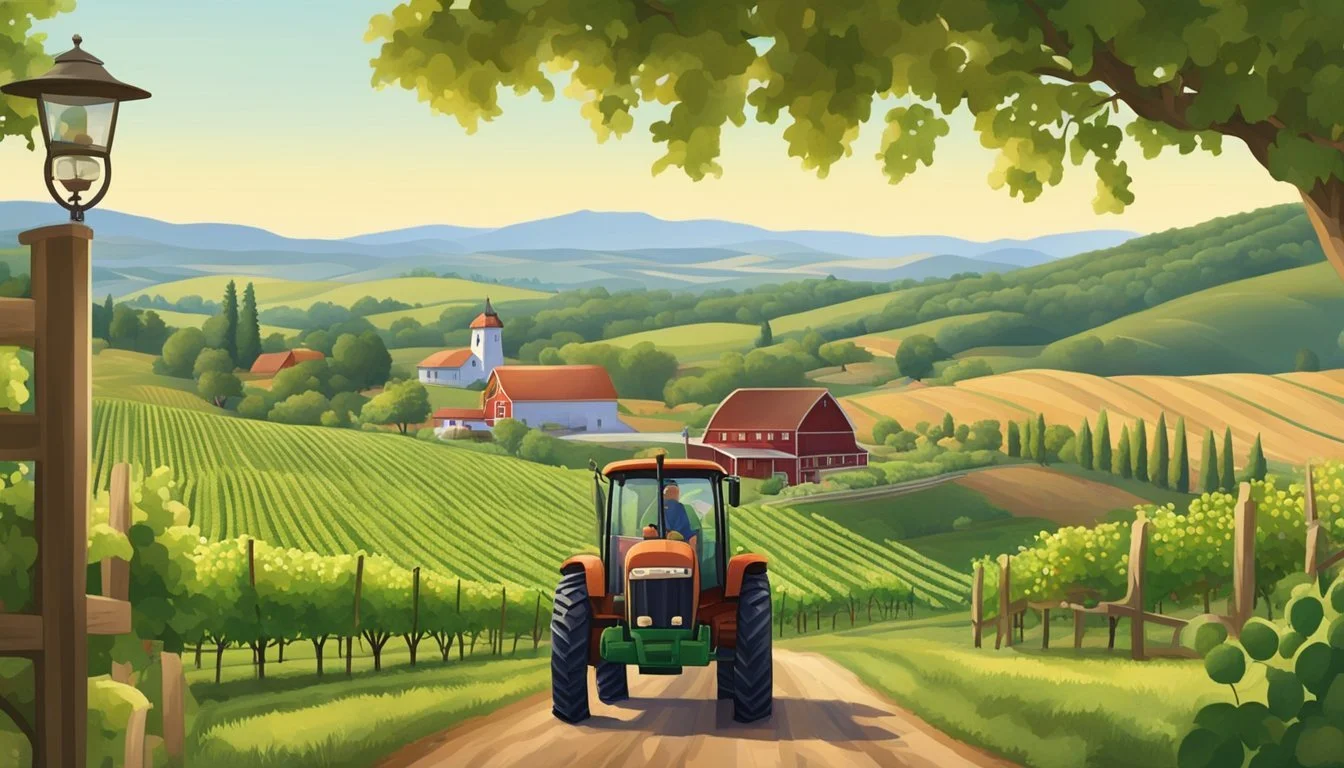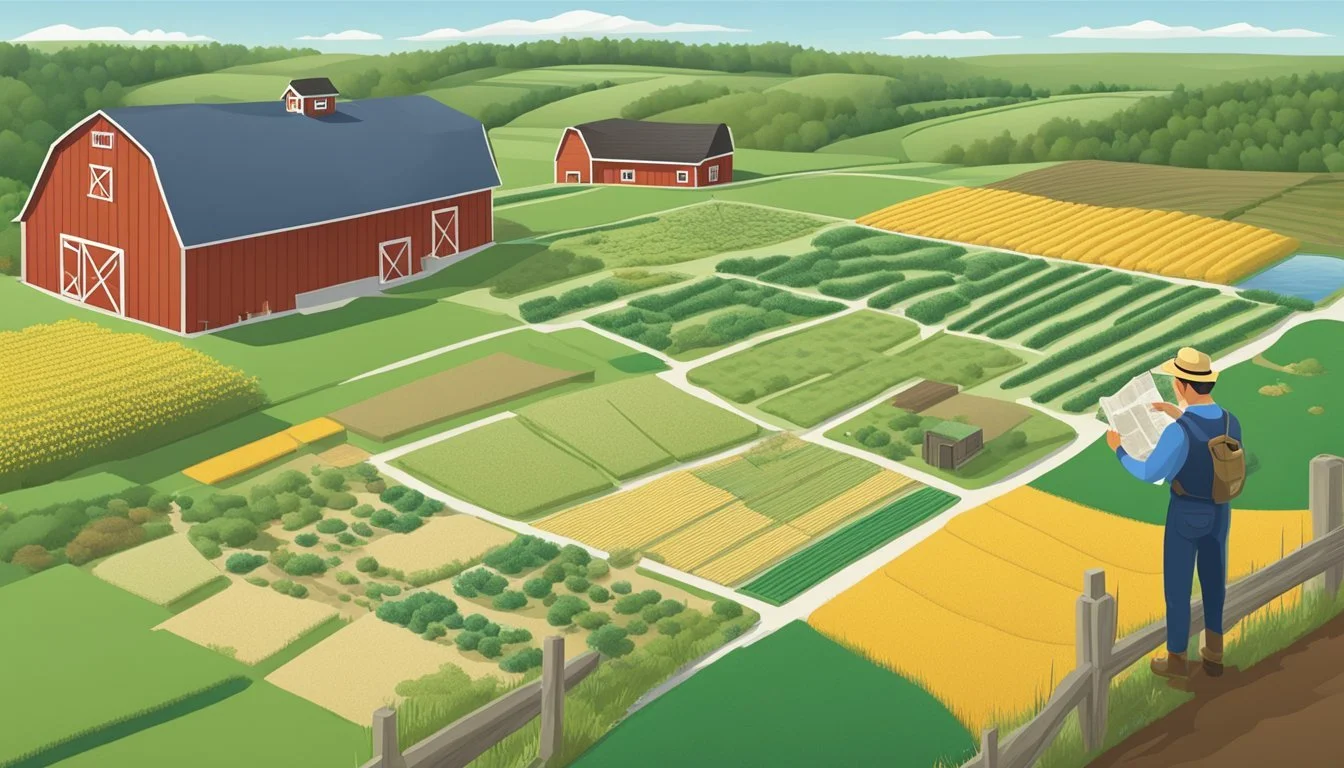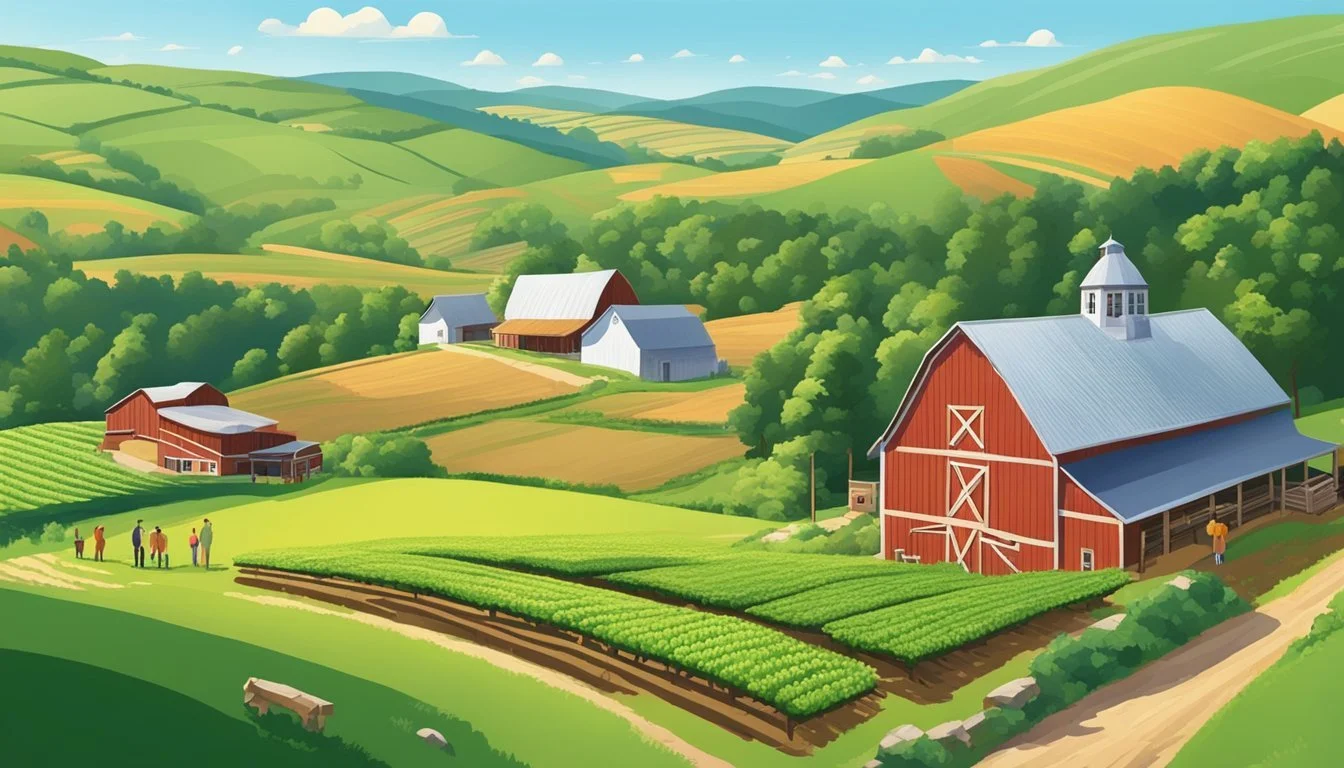Agritourism in Michigan
Exploring the Great Lakes State's Rustic Charm
Agritourism in Michigan offers a unique blend of the state's rich agricultural heritage and its thriving tourism industry. With a diverse range of agricultural products, including apples, tart cherries, blueberries, corn, wheat, sugar beets, and soybeans, Michigan's farms provide a plethora of opportunities for visitors to connect with the local food system and rural life. Michigan's agritourism venues invite individuals and families to engage in a variety of activities, such as picking their own fruits at U-Pick farms, enjoying sleigh rides, visiting animals at petting farms, and navigating corn mazes, allowing for a hands-on experience with the state's farming culture.
The integration of agriculture and tourism fosters a deeper appreciation for the food production process, while also presenting Michigan farmers with avenues to diversify their income. Farmers are able to add value to their traditional farming operations by incorporating agritourism activities which, in turn, can improve economic stability against unpredictable weather and market shifts. Agritourism serves as a testament to Michigan's commitment to supporting its farmers and offering immersive experiences to the public.
Michigan Agritourism's initiatives exemplify the fusion of agrarian lifestyle and recreational tourism. By opening their doors to the public, Michigan farms not only showcase their products and services but also contribute to the state's standing as a considerable force in America's agricultural sector. This collaboration provides a sustainable model for farm preservation and community engagement, ensuring that Michigan's agricultural legacy continues to be a cornerstone of its identity.
History of Agritourism in Michigan
Michigan's agritourism reflects the state's rich agricultural heritage and its evolution into a vital component of its rural economy. This history showcases the transformation from traditional farming to a diversified experience that connects consumers with agriculture.
Agricultural Heritage
Michigan's agricultural heritage is deeply rooted in its diverse landscapes, ranging from fruitful orchards to bustling dairy farms. Over the years, the state has nurtured a strong farming tradition, with agriculture forming the backbone of local economies. Early agritourism in Michigan began with turn-of-the-century farm-based summer resorts along Lake Michigan, revealing an enduring relationship between the land and recreational opportunities.
Evolution of Agritourism
Agritourism in Michigan has evolved significantly, moving from passive farm visitation to a range of interactive and educational experiences. The modernization of agritourism intersects with legislative acknowledgments, most notably during the tenure of Governor Gretchen Whitmer. Under her administration, Michigan Agritourism Month was established to recognize the importance of agritourism to the state’s economy and heritage.
These developments have shaped Michigan's agritourism into a sophisticated blend of tradition and innovation, attracting visitors to partake in its rooted history and modern charm.
Types of Agritourism Attractions
Michigan's agritourism landscape offers a diverse array of attractions that cater to visitors seeking farm-fresh experiences. From savoring local wines to navigating corn mazes, these attractions provide engaging ways to connect with the state's agricultural heritage.
Farm Markets
Farm markets are integral to Michigan's agritourist appeal, offering locally-sourced produce and unique artisanal goods. Visitors can experience the vibrant sensory delight of rows of fresh fruits, vegetables, and handcrafted items, often directly from the producers themselves.
Wineries
Michigan wineries stand out with their award-winning selections, presenting a chance to taste and learn about the region's distinct viticultural varieties. Wine enthusiasts can explore the scenic vineyards and partake in wine tasting events guided by knowledgeable staff.
Cider Mills
Cider mills in Michigan are famed for their freshly pressed apple cider and accompanying fall activities. They often feature orchard tours, apple picking, and the alluring scent of freshly made doughnuts, creating a memorable experience for families and cider aficionados.
U-Pick Orchards
U-pick orchards enable guests to harvest their own fresh fruit, such as apples, cherries, and berries. This interactive experience not only connects visitors with the source of their food but showcases the richness of Michigan's fruit farming landscape.
Farm Stays
Farm stays provide guests a deeper immersion into farm life, where they can stay on working farms, participate in daily farm activities, and enjoy the tranquil rhythms of rural living.
Corn Mazes
Corn mazes are a classic autumn attraction, offering a fun and challenging way to enjoy the harvest season. With intricate designs that change annually, they capture the imagination of all who navigate their twists and turns.
Agritourism Business and Operations
In Michigan, agritourism businesses strategically blend agricultural and tourism services, offering diverse experiences while focusing on sustainable and educational practices.
Marketing Strategies
Agritourism businesses in Michigan utilize targeted marketing campaigns to attract visitors, emphasizing the authentic farm experience. Social media plays a crucial role, showcasing seasonal activities like u-pick orchards and on-farm weddings. Traditional marketing methods such as brochures at local visitor centers also remain effective.
Diversification of Revenue
These ventures typically diversify through a range of offerings:
U-pick activities: apples, berries, and pumpkins
On-farm events: weddings, festivals, and culinary workshops
Retail: farm markets and roadside stands
Agritainment: corn mazes, hayrides, and petting zoos
Diversifying services help stabilize income throughout the year, mitigating the risks associated with farming.
Sustainability Practices
Sustainability is integral to these operations, often evident in:
Energy conservation: solar installations, energy-efficient machinery
Waste reduction: composting, recycling programs
Water management: rainwater harvesting, drip irrigation
Land stewardship: crop rotation, cover cropping
These practices ensure long-term environmental health and resonate with eco-conscious visitors.
Education and Events
Educational components include workshops on sustainable farming, cooking classes featuring local ingredients, and tours that explain the farm-to-table process. Events such as farm-to-fork dinners and agricultural workshops not only generate revenue but also foster community engagement and awareness about the significance of local agriculture.
Economic Impact of Agritourism
The economic contribution of agritourism in Michigan has shown significant benefits for local economies, creation of jobs, and the sustainment of rural communities.
Boost to Local Economy
Agritourism has become a notable economic driver in Michigan, enhancing the local economy through direct sales and additional revenue streams. Reports indicated that Michigan's agritourism revenue reached $21 million, a figure not inclusive of associated wineries and breweries. The state, with a rich variety of over 100 agricultural crops, presents a vast potential for agritourism to further augment local income.
Job Creation
The diversification into agritourism offers myriad opportunities for employment within local communities. Family farms and agritourism operations create jobs not only directly on the farms but also indirectly in sectors such as marketing, hospitality, and service industries. This expansion in job offerings helps to stabilize the local workforce, with agritourism acting as a catalyst for broader economic development.
Rural Community Support
Agritourism is pivotal for the support and vitality of rural communities in Michigan. Economic development in these areas is often tied to the success of agritourism, which provides a platform for local products and traditions. Activities like U-picks, corn mazes, and petting zoos not only generate income but also help to preserve the rural heritage and lifestyle, contributing to a sustainable rural economy.
Seasonal Agritourism Activities
Michigan's rich agricultural heritage comes to life during different seasons, offering visitors a variety of immersive experiences. The state's agritourism thrives particularly during the harvest season and through a diverse array of agritourism events.
Harvest Season
In the fall, agritourism in Michigan reaches its peak with an abundance of harvest activities. Families often flock to pumpkin patches to select the perfect pumpkin for carving. Many farms offer hayrides, giving visitors a leisurely tour of the vibrant, changing foliage and the working fields. Apple picking is another staple, with orchards allowing guests to pick their own apples, a perfect blend of activity and anticipation for the fruit's many uses.
Pumpkin Patches: Usually open from late September through October.
Hayrides: Often paired with pumpkin picking, available at various farms.
Apple Orchards: Offer u-pick experiences featuring a range of apple varieties.
Agritourism Events
During the month of October, which is recognized as Michigan Agritourism Month, a variety of events celebrate the state's agricultural bounty. These events serve as a chance to experience rural life and support local economies. From corn mazes designed for all ages to farmers markets showcasing the freshest local products, each event provides a unique insight into Michigan's farming culture.
Corn Mazes: Mazes open in autumn, presenting both fun and challenge.
Farmers Markets: Events highlight seasonal produce and handcrafted goods.
Visitors to Michigan's agritourism destinations during these times can engage with farmers, savor local flavors, and create lasting memories.
Navigating Regulations and Zoning
In Michigan, agritourism operators must carefully navigate a web of regulations and zoning ordinances. These laws can significantly impact the viability and growth of agritourism ventures.
Michigan Right to Farm Act
The Michigan Right to Farm Act, enacted in 1981, provides farmers with certain protections against local zoning laws when conducting agricultural practices. This act aims to shield farms from nuisance lawsuits and zoning changes that could negatively affect farming operations. When applied to agritourism, the act can offer some level of immunity, provided that the agritourism activities qualify as farm operations under the guidelines of the act.
Zoning Challenges
Despite the protections of the Right to Farm Act, agr*tourism operators often face zoning challenges. Some key concerns include:
Zoning ordinances that limit the types of activities allowed on agricultural land
The necessity of obtaining special use permits for agritourism activities
Conflict with local zoning boards over permissible activities and visitor accommodations
While some agritourism businesses have encountered hurdles with zoning restrictions, state and local governments have made efforts to adapt regulations to support this growing sector.
Local Resident Relations
Relationships with local residents are critical in the context of agritourism and can affect zoning outcomes. Operators should engage with their communities to:
Educate residents about the positive impact of agritourism on local economies and land preservation
Address concerns about increased traffic, noise, and other potential disturbances
Positive relations with local residents can lead to a more favorable view of agritourism, mitigating conflicts and promoting a supportive environment for these businesses to thrive.
Agritourism and Community
Agritourism in Michigan bolsters local economies and fosters social cohesion by connecting people with agricultural experiences. These interactions are pivotal for the support of local agriculture and extend outreach with significant social benefits.
Local Agriculture Support
Michigan's embrace of agritourism has proven instrumental in sustaining and enhancing local agriculture. By inviting visitors to participate in farm activities, agritourism serves as a critical revenue stream for small and medium-sized farms. Entities like u-pick orchards and vineyards gain financial support directly from consumers, which in turn stimulates the local agricultural industry. This symbiotic relationship ensures that:
Farms diversify income
Agrobiodiversity is maintained
Local jobs are supported
Moreover, with initiatives like Michigan's Right-to-Farm law, farmers receive protection and encouragement to merge traditional agriculture with tourism.
Outreach and Social Benefits
Agritourism acts as a conduit for outreach and the cultivation of community bonds. Events and farm visits provide platforms for education and cultural exchange, aligning closely with the state's goals for rural entrepreneurship and economic development. The benefits are multifaceted, including:
Education on sustainable practices
Preservation of agricultural heritage
Reinforcement of community identity
Socially, agritourism engenders a deeper understanding and appreciation for the labor and craft of farming, thereby fostering a sense of community solidarity and stewardship. It also serves as an impetus for public-sponsored events, such as proclaiming October as Agritourism Month, further solidifying the community-farm relationship.
Consumer Engagement and Education
In Michigan, agritourism has become a prominent method for consumers to deepen their understanding of agriculture and participate in family-friendly activities. The industry serves as a catalyst for education about farming practices and provides access to nutritious food directly from the source.
Family-Oriented Activities
Michigan’s agritourism venues offer a variety of family-oriented activities that engage consumers of all ages in the farm experience. From corn mazes and u-pick apple orchards to haunted barns, these activities combine enjoyment with education, giving families a hands-on approach to learning about farming and food production. Family farmers often serve as guides and educators, enhancing the visitor's experience and understanding.
Agritourism Directory
To facilitate consumer engagement and ensure easy access to agritourism experiences, Michigan maintains a comprehensive agr{#x27;itourism Directory. This resource lists farms across the state that welcome visitors for educational tours, recreational activities, and direct purchase of farm-fresh products. The directory serves as a guide for consumers to connect with family farmers and participate in agriculture.
Available: Online and in print
Details Include: Location, types of activities, and available produce
Farm to Table Movement
The farm-to-table movement in Michigan underlines the importance of nutritious food and educates consumers about the benefits of consuming fresh, locally-sourced products. This initiative supports family farmers by fostering direct relationships with consumers who are increasingly interested in the origin of their food. It promotes transparent interaction between farmers and consumers, often including farm visits, cooking demonstrations, and educational workshops.
Focus: Freshness, nutrition, local economy
Impact: Strengthens consumer-farmer relationships
Challenges in Agritourism
Agritourism in Michigan faces a variety of hurdles that can affect its operations and profitability. Weather patterns, market volatility, and worldwide events are amongst the primary concerns for farm operators engaging in tourism ventures.
Weather and Climate Risks
Michigan's climate poses significant challenges for agritourism businesses. Operators must deal with poor weather conditions such as:
Unpredictable severe weather events (e.g., storms, floods)
Long winters and late frost dates that shorten the tourism season
These erratic patterns can lead to reduced crop yields, infrastructural damage, and deterred tourists, impacting revenue streams and operational planning.
Market Fluctuations
The market for agritourism is subject to fluctuations based on various factors including:
Consumer preferences – Shifts towards or away from rural experiences affect demand
Agricultural prices – Variability in crop prices can alter profit margins
Local competition – Emergence of new attractions can sway visitor numbers
Maintaining economic stability is a key challenge as fluctuations can quickly turn a prosperous season into a financially unstable one.
Impact of Global Events
Global events, most notably the COVID-19 pandemic, have underscored the vulnerability of agritourism to external disruptions. These impacts manifest in:
Travel restrictions: Disruptions to local and international travel can severely limit tourist numbers.
Safety protocols: Implementation of health measures (e.g., social distancing) affects visitor experiences and operational capacities.
Adapting to new norms has become crucial for the continuity of agritourism entities across Michigan.
Future Trends in Agritourism
The landscape of agritourism in Michigan is poised to evolve with technological advancements and innovative offerings that are anticipated to contribute to the sector's success.
Digital Marketing
Agritourism ventures capitalize on digital marketing strategies to become more searchable and accessible to potential visitors. Farmers and business operators utilize SEO (Search Engine Optimization) to improve online visibility and use social media to engage with a broader audience. They also leverage the Pure Michigan campaign's digital presence to amplify their reach.
SEO Techniques:
Creating keyword-rich content
Optimizing website structure
Social Media Strategies:
Engaging with users through posts
Utilizing paid advertising for target market reach
Innovative Agritourism Experiences
Michigan's agritourism is integrating innovations that create unique, memorable experiences for visitors. From farm-to-table dining events to hands-on agricultural workshops, businesses are expanding beyond traditional offerings. Thematic tours and agricultural festivals have also become significant attractions, providing educational and entertaining experiences.
Examples of Innovations:
Thematic agricultural trails
Interactive farming workshops
Industry Growth Outlook
The industry's growth outlook remains robust, with expectations of accelerated development founded on both consumer interest and economic factors. Yet, operations must stay attuned to market fluctuations to maintain stability and continued growth. Data from upcoming agricultural census reports will likely underscore this expansion and might highlight increased profitability within the sector.
Factors Influencing Growth:
Consumer demand for authentic experiences
Regional economic policies supportive of agritourism
Challenges:
Navigation of market fluctuations
Adherence to evolving agritourism regulations









